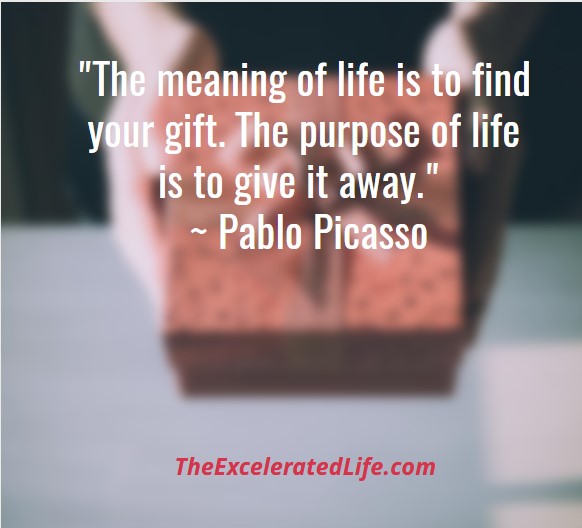Excelerated Positivity™ embraces the concept of PERMA, Martin Seligman’s Theory of Well-Being. One of the pillars of well-being is Meaning. As you begin to bring Meaning into your life, you can use Dr. Paul Wong’s concept of PURE (Purpose, Understanding, Responsible action, and Enjoyment) as a structure for Meaning.
TheExceleratedLife.com

From Happiness To Flourishing
In 1998, Martin Seligman became president of the American Psychological Association (APA). Seligman wanted to emphasize prevention over cure. At that time, the field of psychology was nearly exclusively focused on how to treat people with various psychological and mental problems. Seligman wanted to find interventions to prevent the issues in the first place. There was already plenty of information on the cure of illnesses, so Seligman decided to focus on how to replicate positive emotions to enable people to “acquire the strengths and virtues” associated with them. This was the birth of Positive Psychology.
In 2002, Seligman published Authentic Happiness, where he elaborated on his ideas. Here is where he developed the Happiness Formula: H = S + C + V, where H is your overall level of happiness, S is your happiness “Setpoint” – your genetic happiness “baseline”, C represents the Circumstances of your life, and V stands for things under your Voluntary control.
Over the years, Seligman and his colleagues refined his original approach. Nine years later, in 2011, Seligman published Flourish. In Flourish, Seligman details the thinking behind how his Happiness Forumla grew into the PERMA (Positive emotions, Engagement, positive Relationships, Meaning, Accomplishment) theory of well-being.
“I used to think that the topic of positive psychology was happiness, that the gold standard for measuring happiness was life satisfaction, and that the goal of positive psychology was to increase life satisfaction,” Seligman writes in Flourish. “I now think that the topic of positive psychology is well-being, that the gold standard for measuring well-being is flourishing, and that the goal of positive psychology is to increase flourishing.” [Seligman – Flourish]
Positive Psychology 2.0
Happiness, Seligman decided, was based on and disproportionately measured by our mood and how good we feel. This turns out to be a shallow measure of true positivity. People who aren’t cheerful may have more meaning and engagement than their “happier” counterparts. This thinking moved Positive Psychology from a focus on happiness and positive emotion to a broader focus on well-being and flourishing. What we might call Positive Psychology 2.0.
In fact, another psychologist, Dr. Paul T. P. Wong writes: “Properly understood, the overarching mission of Positive Psychology is to answer the fundamental questions of what makes life worth living and how to improve life for all people.” [Wong]
Wong cautions against emphasizing positive emotions exclusively, as have other psychologists. Indeed, Wong says, negative emotions can also move us toward positive changes. “A balanced model of Positive Psychology explicitly seeks to harness the positive potentials from negative emotions and situations for both individuals and society.” [Wong]
Eudaimonic Happiness
Excelerated Positivity™ shares this view of Positive Psychology 2.0. “The ideal state of the human mind is not irrational indulgence in mere sensory pleasure (hedonism),” writes Donald Robertson in The Philosophy of Cognitive Behavioural Therapy, “but something known as eudaimonia, a Greek term that encompasses rational fulfillment, happiness, and well-being.” [Robertson]
As Paul Wong defines it, eudaimonia is “a lifestyle characterised by the pursuit of virtue/excellence, meaning/purpose, doing good/making a difference, and the resulting sense of fulfillment or flourishing.” [Wong]
When we speak about happiness in relation to Excelerated Positivity™, we generally mean “eudaimonic happiness”.
Meaning
Well-being, Seligman says, is like “weather” or “freedom”: “no single measure defines it exhaustively . . . but several things contribute to it; these are the elements of well-being, and each of the elements is a measurable thing.” [Seligman – Flourish]
One of the elements of PERMA, and the one we are focusing on today, is Meaning. Meaning and purpose are components of eudaimonic happiness and are also important parts of the Excelerated Life™ (a life of flourishing and well-being, and a life of meaning, purpose, and service).
The Meaningful Life consists in belonging to and serving something that you believe is bigger than the self. [Seligman – Flourish]
PURE
Paul Wong considers meaning to be one of the “four pillars of Positive Psychology”, along with virtue, resilience, and well-being. [Wong] He has identified a structure, PURE, for attaining meaning in our lives. PURE stands for the four components of Purpose, Understanding, Responsible action, and Enjoyment. [Wong]
Purpose
A sense of purpose provides the foundation for creating a meaningful life. Your purpose is in two forms: universal and unique. We share a universal purpose of service – using our gifts, talents, strengths, and skills in service to the world. The way each of us chooses to be of service is our unique purpose based on our particular combination of gifts, talents, strengths, and skills.
Understanding
Knowing you have a purpose is one thing. Understanding how you fit into your world and how you use your unique skill set is another step. Understanding means you know your unique purpose and you know how you can use your talents, skills, and strengths for your purpose. Self-understanding and self-acceptance are important parts of creating a meaningful life. [Wong] And so too is the understanding and acceptance of others.
Responsible Action
Knowing your purpose is essential. So is understanding how you can take steps to live on purpose. But in order to bring meaning into your life, you need to take the steps that move you in the direction of your purpose. At the same time, you must balance your self-interest with the self-interest of other people. You must also take into account the context in which you live, such as your “city or country or environment or even God”. [Wong]
“To decide on the right course of action demands that we have the right purpose in life, the correct understanding of the situation, and careful consideration of its consequences on other people,” writes Wong. “One is responsible not only to one’s own conscience and conviction but also to others and a higher authority.” [Wong] This is Responsible action.
Enjoyment And Evaluation
Doing good leads to feeling good about oneself. When you move in the direction of your purpose, using the skills and strengths that you have refined into responsible action, you have feelings of accomplishment and satisfaction. [Wong] This is eudaimonic happiness arising from the pursuit of excellence, meaning, and purpose. The result? A life of flourishing and well-being.
Bigger Than The Self
“The Meaningful Life,” says Dr. Seligman, “consists in belonging to and serving something that you believe is bigger than the self, and humanity creates all the positive institutions to allow this: religion, political party, being green, the Boy Scouts, or the family.” [Seligman – Flourish]
While some of these institutions have been tarnished by recent events, the underlying purpose remains the same and you can certainly find ways that are important to you to bring meaning to your life. Get involved with a local non-profit organization. Work within your church’s missions or with the larger church organization. Find a way to help a marginal group within your community. Determine your purpose then devise ways to live it. Find something you believe in that is bigger than the self and devote a portion of your time, energy, and money to bring it to fruition.
Find PURE Meaning
Excelerated Positivity™ embraces the concepts of “Positive Psychology 2.0”, moving beyond hedonic happiness to eudaimonic happiness and an orientation around the pursuit of meaning.
As you begin to move toward living a meaningful life, remember Dr. Wong’s concept of PURE: Purpose, Understanding, Responsible action, and Enjoyment. Consider the Universal purpose and then find your unique purpose. Use what you learn to bring PURE meaning into your life. That is embracing the Excelerated Life™!
Excelerated Positivity™ — building the skills in positivity that help you flourish — is one step in creating your Excelerated Life™, a life of flourishing and well-being, and a life of meaning, purpose, and service.
Read more about the Excelerated Life™.
Resources:
Robertson, Donald. The Philosophy of Cognitive Behavioural Therapy: Stoic Philosophy as Rational and Cognitive Psychotherapy. Oxford, UK: Taylor & Francis, 2010.
Seligman, Ph.D., Martin E. P. Authentic Happiness. New York: Free Press, 2002
Seligman, Ph.D., Martin E. P. Flourish. New York: Free Press, 2011.
Wong, Paul T. P. “Positive Psychology 2.0: Towards a Balanced Interactive Model of the Good Life.” June 1, 2014. PDF. December 28, 2020.
https://www.researchgate.net/publication/232427108_Positive_Psychology_20_Towards_a_Balanced_Interactive_Model_of_the_Good_Life



One Reply to “Creating A Meaningful Life”